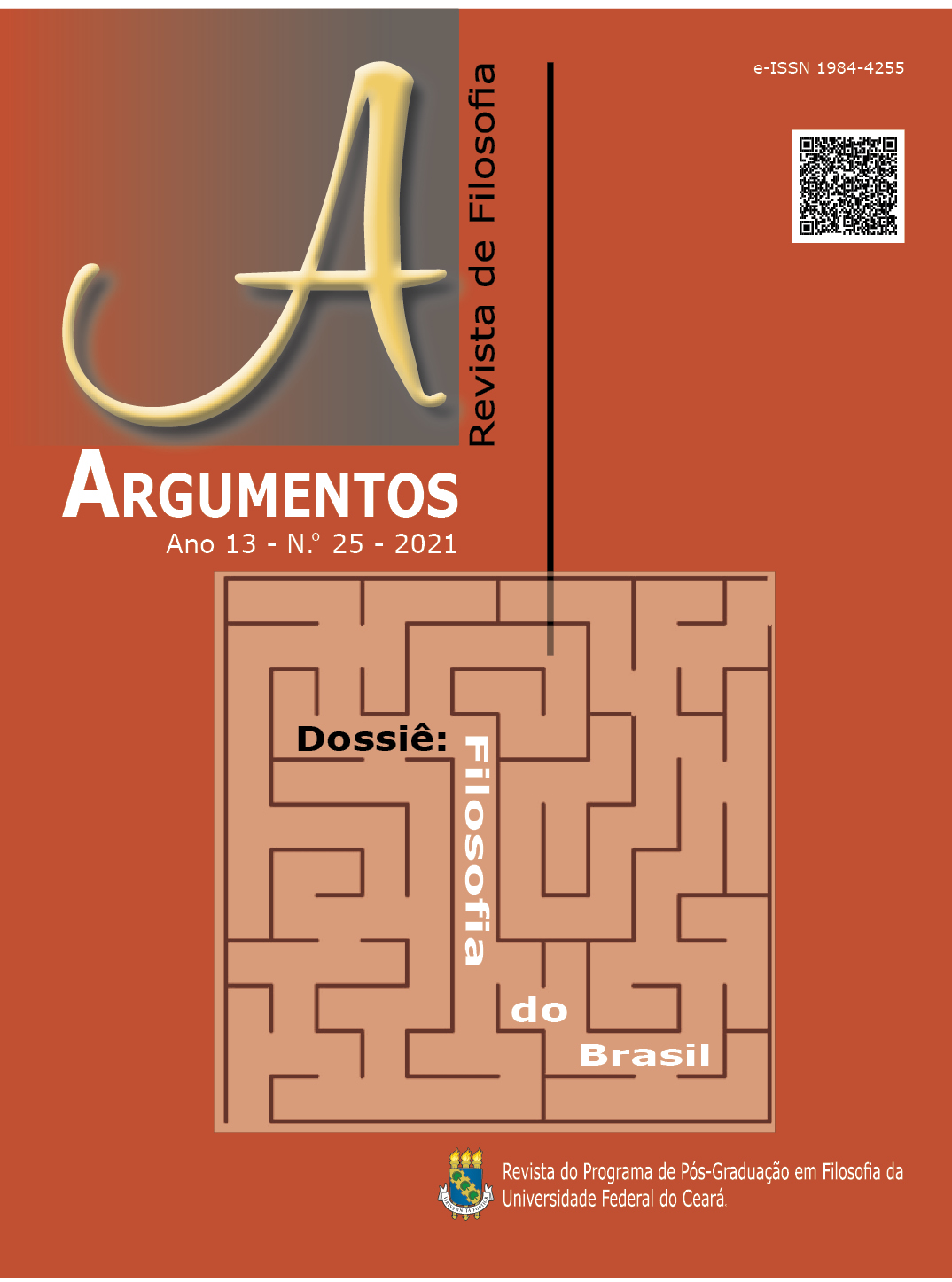Science, freedom and creation in the thought of Pedro Américo
DOI:
https://doi.org/10.36517/Argumentos.25.13Keywords:
Natural Philosophy. Freedom. Truth. Rationalism.Abstract
In this work, we seek to present Pedro Américo’s concept of science, discussing his opposition to positivism, a defense of “experimental rationalism”, and an importance of freedom, capacity and the search for truth as the values of Natural Philosophy. Finally, we will see how Art and Science form, in the thought of Pedro Américo, a basis for an ideal of life and culture, guided by the freedom of creation.
References
BARROS, Francisca Argentina Gois. A arte como princípio educativo: uma nova leitura biográfica de Pedro Américo de Figueiredo e Melo. 2006. 186f. Tese (Doutorado em Educação). Universidade Federal do Ceará, Faculdade de Educação, Programa de Pós-graduação em Educação Brasileira, Fortaleza, 2006.
BOLTZMANN, L. Escritos Populares. Trad. Antonio Augusto Passos Videira. São Leopoldo: Unisinos, 2004.
COHEN, B. Hypotheses in Newton’s Philosophy. Boston Studies in the Philosophy of Science, 5 (1969). p. 304-326.
COHEN, B. The first english version of Newton’s Hypotheses non fingo”. Isis 53/3, (1962). p. 379-388.
EINSTEIN, A. Eine neue Bestimmung der Moleküldimensionen. Annalen der Physik, Band 19, 1906, In Ann. Phys. (Leipzig) 14, Supplement (2005). p. 229-247.
EINSTEIN, A. Física e realidade. Rev. Bras. Ensino Fís. 28, n. 1.
FARIAS BRITO, R. Finalidade do Mundo. Vol. 1. Brasília: Edições do Senado Federal, 2012.
GLICK, Th. O positivismo brasileiro na sombra do darwinismo: o grupo ideia nova em desterro. In:
DOMINGUES, HMB.; SÁ, MR.; GLICK, T. (Orgs.). A recepção do Darwinismo no Brasil [online]. Rio de Janeiro: Editora FIOCRUZ, 2003.
KOYRÉ, A. Do espaço fechado ao universo infinito. Rio de Janeiro: Forense Universitária, 2006.
KURY, L. Homens de ciência no Brasil: impérios coloniais e circulação de informações (1780-1810). Hist. cienc. Saúde – Manguinhos, 11/1 (2004). p. 109- 129.
MACIAL, F. O jovem Pedro Américo, entre Arte, ciência do Belo e um outro nacional. São Paulo. Tese (Doutorado em Artes) Universidade de São Paulo, 602f., 2016.
MELO, Pedro Américo de Figueiredo. A ciência e seus sistemas: Questões de História e Filosofia Natural. Trad. G. Oliveira. João Pessoa: Editora Universitária UFPB, 1999.
MELO, Pedro Américo de Figueiredo. A ciência e seus sistemas: Questões de História e Filosofia Natural. 4. ed. Trad. G. Oliveira e M. Coutinho. João Pessoa: Editora Universitária UFPB, 2001.
MELO, Pedro Américo de Figueiredo. Considerações filosóficas sobre as Belas Artes entre os antigos. João Pessoa: Editora Universitária UFPB, 2006.
MIGUEL, L. R. Wiliam Whewell: as motivações e os objetivos de um filósofo da ciência. In: VIDEIRA, A. (Org.). Perspectivas contemporâneas em Filosofia da Ciência. Rio de Janeiro: Eduerj, 2012.
NEWTON, I. The Principia Mathematical Principles of Natural Philosophy. Translation I. Bernard Cohen and Anne Whitman. Berkeley: University California Press, 1999.
OLIVEIRA, J. M. Pedro Américo. Sua vida e suas obras. Rio de Janeiro: Imprensa Nacional. Ministério da Educação e Saúde, 1943.
POPPER, K. Três concepções acerca do conhecimento humano. Trad. P. Mariconda e P. Almeida. São Paulo: Abril Cultural, 1980. (Coleção Os Pensadores).
ROMERO, S. A philosophie no Brazil. Porto Alegre: Tipografia de Deutsche Zeitung, 1878.
SILVA, V. Teoria quântica, Física Nuclear e Filosofia Grega. Griot, v. 15, n. 1, 2017. p. 233-250.
SILVA, V. Um ideal de ciência: José Leite Lopes e a História da Física no Brasil. Ciência e Sociedade, v. 6, n. 2, 2019. p. 35-47.
VIDEIRA, A. (Org.). Henrique Morize. Rio de Janeiro: Fundação Miguel de Cervantes, 2012.
VIDEIRA, A. A inevitabilidade da Filosofia na Ciência Natural do século 19: O caso da física teórica. Ijuí: Ed. da Unijuí, 2013.
VIDEIRA, A. As descobertas astronômicas de Galileu. Rio de Janeiro: Vieira e Lent, 2009.
VIDEIRA, A. Filosofia da Ciência sob o signo dos Science Studies. Abstracta, v. 2, n. 1, 2005. p. 70-83.
Downloads
Published
Issue
Section
License
Argumentos magazine is licensed under an International Creative Commons Attribution License.
The Magazine uses CC BY inclusion
1) The authors retain the copyright granted to the magazine or the right to initial publication, with the work regularly licensed under the Creative Commons Attribution, which allows the sharing of the work with acknowledgment of authorship and initial publication in this magazine.
2) The authors are authorized to contract additional applicable contracts, for non-exclusive distribution of the version of the work published in this journal (for example, publication in the institutional repository or as a chapter of the book), recognition of authorship and initial publication in this journal.
3) Authors are authorized and encourage to publish and distribute their work online (for example, in institutional repositories or on their personal pages) at any time before or during the editorial process, as they can generate productive changes, as well as increase the impact and reference of published work.




.jpg)










._._3.png)
1.jpg)
._._._.png)
